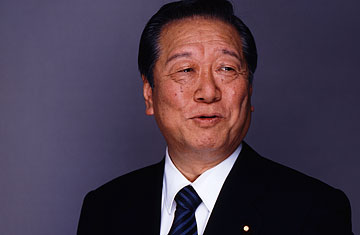
Ichiro Ozawa
(3 of 3)
TIME: The relationship between Japan and China is obviously one of those things that interests the whole world, not just the region. How do you see the two countries relating to each other in the next few years?
OZAWA: The Japan-China relationship is important next to the relationship with the United States.
Looking at the past relationship between Japan and the United States and Japan and China, I should say that the Japanese government has failed to come up with very clear explanations of their own positions. For that very reason they failed to have a solid and substantive discussion with these two countries.
I have had the experience of being involved in economic trade negotiations with the United States because after several rounds of negotiations, there was no one on the Japanese side that was willing to take up that responsibility. The biggest problem, when I got involved in the negotiations, was not about substantive issues. Rather, the American side thought the Japanese negotiators were lying, and they didn't keep their promises. I spent about half the negotiation time convincing them that I would keep my promises. The same situation applies in our relations with China. Every time an official from China visits Japan and meets with a Japanese official, they always take up the issue of history. But they do not take up the issue of history when they meet me. I say a lot of things that might in fact sound very tough on their ears.
But the biggest problem in regard to China is that the contradiction between their market economy and communist rule has grown immensely. In this situation there is a unique role that can be played by Japan, given the fact that Japan is similar to China in terms of culture and ethnicity and has a relationship that spans more than 1,000 years. Using this unique position, Japan should make every effort, together with the United States, to persuade and encourage China to move toward democratization.
TIME: In the past week, there have been allegations about money politics in Japan, allegations about illegal campaign contributions. What is your reaction?
OZAWA: Whether we are talking about political contributions, or the accounts of private entities, or government agencies, what is crucially important is full disclosure. We have to make everything open. My view is that Japanese society is a very closed society. But when it comes to political donations, I think that politicians should be able to rely on donations from anyone and should be able to use them as they wish, so long as everything is fully disclosed, and is available to the Japanese voters. It is up to the voters to make the decision as to whether such donations are rational or not.
I disclosed all the information with regard to all the political donations given to me and how those donations were used. There was some criticism with regard to non-disclosure regarding the spending of political donations —I think it happened a year or two ago — and so I decided to release all the receipts to the press. To my knowledge I am the only Diet member who disclosed all the information relating to political donations to that extent.
TIME: Were you surprised that these allegations were made last week as we approach an election? Might they result in you stepping down as President of the DPJ?
OZAWA: I was, I was surprised, I was very surprised. My secretary was arrested by the prosecutors and the reason for the arrest was entry errors in the political fundraising records. Similar things have happened many times over not only with politicians, but also with ministers as well as former prime ministers. When this has happened before, the only thing that was often required was to make corrections (to entry errors). But in this case, all of a sudden my secretary was arrested. So I was very surprised by the whole thing and I was also very puzzled about how that happened.
TIME: OK, last question: I've read many times that you have always been fascinated by the history of the Meiji Restoration of the late 19th century. Is there something about that period that people can take today and use to reform Japan?
OZAWA: I believe that the Meiji Restoration is one of the greatest revolutions in global history. The Meiji government took as their policy to pursue, catch up and surpass the Western powers. I am convinced that we have to carry out a similar revolution of the same magnitude. But the Meiji Restoration was achieved by force. We will bring about a revolution by democratic means, by achieving a majority in the election.
